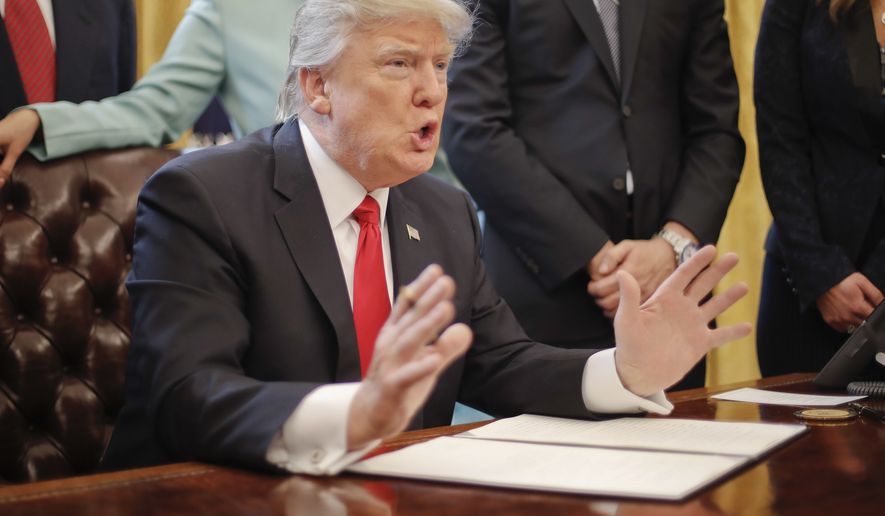OPINION:
Once more, with feeling. There’s a president with the proper appreciation of “the special relationship” between the United States and Great Britain. Winston Churchill is back in the Oval Office, even if it’s only his head on a pedestal.
Donald Trump and Theresa May struck it off better than expected. The Donald even took her for a stroll, holding her hand. A British journalist reminded the president not to try that with the queen when he goes to London for a state visit in the spring. The queen is look, don’t touch.
The special relationship dates from early in the 19th century. It was sometimes not as warm as at other times, particularly after the Civil War when Britain, eager for Southern cotton, flirted with recognizing the Confederacy. The relationship became the pivot of U.S.-British foreign policy during World War II, when Churchill and President Franklin D. Roosevelt enjoyed a friendship that was at first testy when FDR resisted Churchill’s pressure to join the war in Europe, where Britain stood almost alone against Hitler and the Nazis.
It became warm with even a touch of schmaltz after Pearl Harbor and Hitler’s inexplicable declaration of war against the United States two days later. Churchill promptly came to Washington for a visit, and charmed senators and representatives alike with a memorable speech to a joint session of Congress.
“As some of you know,” he told the assembly, “my mother was born in America, and my father in Britain. I like to think that if it were the other way around, I might have made it to this chamber on my own.”
The special relationship flowers when president and prime minister grow close. Maggie Thatcher was particularly close to both Ronald Reagan and George H.W. Bush. When Mr. Bush seemed to be wavering in pursuit of Saddam Hussein in the run-up to the first Gulf war, she famously told him, “now don’t go wobbly on us, George.” He didn’t, and they became fast friends. “The Anglo-American relationship,” Mrs. Thatcher later said, “has done more for the defense and future of freedom than any other alliance in the world.”
Theresa May could similarly nudge Donald Trump, a novice in the complicated ways nations deal with each other, to do the right thing. She made a point last week to say, as they basked in the warmth of the visit, how important NATO is to the defense of the United States, Britain and the West. The next day Mr. Trump, who had gone a little bit wobbly himself in the presidential campaign on the long-standing American dedication to the alliance, said warm and positive things about it.
Guns and diplomacy have been important elements of the practical value of the special relationship, but the common language, literature, law and religious faith made such a relationship inevitable, and assured its survival. Personal relationships between president and prime minister oiled the machinery and made it hum.
As warm as that personal relationship was during World War II, frost was not only on the pumpkin during World War I, but on the relationship between Woodrow Wilson and David Lloyd George. They were first president and prime minister who met face-to-face, and not happily.
No one cultivated the relationship with greater skill than Churchill, who liked nearly all things American, and often cited the fact that his mother, Jenny Jerome, born in Brooklyn, was an American. She was a celebrated beauty in London, where she became a titled socialite. An admirer said there was “more of the panther than the woman in her look.” Perhaps Churchill, with a tenacity of a wild animal stalking prey, inherited more than maternal devotion from his American mother.
Other presidents became friends with prime ministers, too, strengthening the special relationship. John F. Kennedy and Harold Macmillan became close; so did Jimmy Carter and James Callaghan, and both Bill Clinton and George W. Bush worked closely with Tony Blair.
But the relationship was not always a happy one. Sentiment is not for statesmen. JFK entertained Mr. Macmillan at Key West shortly after he was inaugurated, and they got on well. The prime minister said, with his tongue not necessarily in his cheek, that “it is Britain’s historical duty to guide the power of the United States as the ancient Greeks guided the Romans.”
The special relationship has always been the envy of the allies. Charles de Gaulle and certain of his successors chafed under the dominance of what de Gaulle called, with a contemptuous curl of the lip, “the Anglo-Saxons.” He would have liked Barack Obama, who, perhaps influenced by his Kenyan father, never quite hid his disdain for the English.
But blood will out. The Donald and Theresa look like cousins, even if once removed.
• Wesley Pruden is editor in chief emeritus of The Times.




Please read our comment policy before commenting.